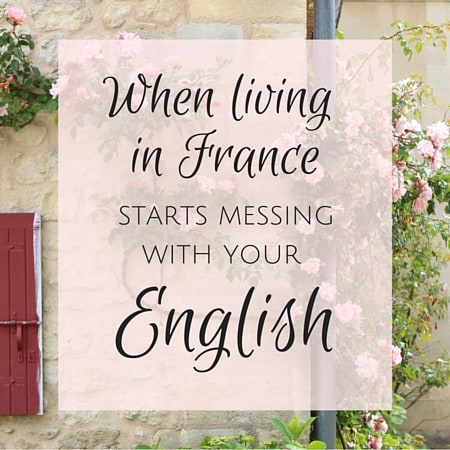Bonjour, tout le monde! Every now and again, I put out a call for guest posts from fellow bloggers who are part of the Oui In France community and now is that time. I have a guest post coming to you today from Alex of French in Plain Sight and everything he says is SO TRUE. I echo everything he says below about this common misconception — that living in France will effortlessly make you fluent in French, just like that. Just move here and you’ll speak French like a native! It’s not true!
Why living in France won’t automatically make you fluent
First, if you don’t know Alex, he’s an English guy who came to France at 28 to follow a feeling of purpose he’d found in learning the French language. He lives in Montpellier and is now a French Coach online for English-speaking intermediate French learners at French in Plain Sight. He offers 1:1 coaching and a group coaching experiences, and I highly recommend him as a coach because he gets what us sensitive types go through learning French.
Anyway, you can also find Alex on YouTube (we did a collab together here on my channel) making weekly motivational YouTube videos about the process of learning French and the language itself. CHECK HIM OUT!
What follows are his words…

Credit: www.shutterstock.com/Song_about_summer (and feature image)
When I first arrived in France 5 or 6 years ago from the U.K., I had a big goal to become a fluent French speaker and I’m pleased to write that I have achieved that goal and am now a French coach for other English speakers living here. Now that I think about it, I had probably reached what I consider fluent at about year three or four. It’s different for everyone.
It depends on your definition of fluent and how much you work at it.
One pervasive belief that I often see making its way into conversations both online and offline among people with an interest in moving to France or simply learning the language is that it’s a shame they aren’t in the country because — and I’m paraphrasing here — “moving to France is the secret to fluency. Once I get to France, my French will get sooo much better.”
Today, I’d like to talk about why living in France isn’t the secret to French fluency many people — whether consciously or subconsciously — believe it to be. In the absence of certain key elements, it doesn’t matter whether you live in Paris, Marseille, un petit village dans l’Ardèche, Michigan, or Manchester, your French won’t progress.
Conversely, the presence of these elements will lead to your language skills and confidence flourishing. Let’s discuss these elements and give suggestions for how you can engineer things in your favor, if indeed you intend to or are already learning la langue française.
1. Attitude
Perhaps the most important on this list because it applies to everyone, both those in France or outside, is attitude. Attitude plays a role in all the other elements in this list actually.
With the right attitude anyone can become fluent. Anywhere.
Progress can be seen in the smallest tasks on a daily basis which leads to enjoying the process, leading to doing more, which leads to progressing more.
With the wrong attitude, you’re going to slow yourself down, probably get frustrated and depressed, which leads to resistance, which leads to inconsistency, which leads to very little progress.
If you allow yourself to believe that French can only be learned in the classroom or that you’re just not good at languages or that you’re too old to learn, well then you’re going to prove yourself right at some point.
Equally, if you believe that trying a little bit every day and appreciating all the small signs of progress all accumulate to great things, then great things will happen.
Moving to France is the best way to improve if you have solid foundations and the right attitude to match the challenge that is learning to speak a new language. If you create space in your everyday routine for the French language to settle in and permeate into all areas, then you will improve much faster.
Creating this space is certainly easier if you live in France because the language is everywhere you look when you step outside, but it’s incredibly facile (easy) to spend the whole day reading and working in English, to speak English to your partner, and to think about all the things you need to do and do it in English.
My point is that in our busy lives of today French — even if you live in the country — very quickly, if not immediately becomes an afterthought and from there it’s an uphill battle.
The more you can open yourself up to French, the more you’ll acclimatize to the challenge: flick through the news on Le Monde rather than BBC with your morning coffee, have Radio France on whilst shaving, speak what few French words you know to waiters, neighbors, or real estate agents. It doesn’t feel natural at first.
But NOT doing it just keeps the language at arm’s length and is just delaying that adaptation that you really need in order to one day be fluent.
Give space to French in your everyday life. Plant the seed and watch it grow.
Big roundup of my best French language learning tips >>

Credit: Shutterstock.com/mavo
2. Your circle
On the theme of giving space to French, the people in your life — your entourage — play a big role in how much of the French language you have in your day-to-day.
I’m referring to the languages they speak, the contexts from which you know them, their backgrounds, how often you see them, and surely others that have escaped me for the moment. I’m also referring to whether they are classed as a friend, an acquaintance, or simply the local baker.
It helps greatly in the long term if from Day 1 you’re surrounded by people who only speak French to you. However, in the short term, this can lead to feelings of isolation, regret, loneliness, and inadequacy. It doesn’t matter if this promises fluency in the long term through being forced to speak French. If you can’t even enjoy your day-to-day life whilst in that situation, what’s the point?
Equally, speaking only English to people when you know someone around the corner from you who is a native French speaker is just a waste of a great opportunity. Sure, it might just be 30 seconds or less of an interaction and you might think you’re not ready, but it’s doing it that shows you what you’re capable of. It creates that space for French, as I talked about earlier, which more often than not is a chance for personal growth. Growth begets confidence which leads to more space for French.
So, balance is needed. Having a circle which speaks exclusively French to you when you’re a beginner is good but not good for everybody. However, having a circle with whom you speak exclusively English isn’t good for any learner because…well there’s no French. You need to find a middle ground.
For example, in my entourage, we have a diverse group of nationalities : Turkish, British, American, Australian, Tunisian, German. It would be easy to only speak English. But it’s in this group where it’s perfect to practice French because it’s a group with which I’m comfortable. I can switch back and forth without judgment, knowing that the time I spent in French all contributes to my overall progress.
My point here is to stay conscious about the makeup of your circle. Don’t let it form itself around you. Make sure you have a say and again, consciously create space for French by allowing the language to be one of the criteria in deciding who to spend time with.

Credit: www.shutterstock.com/Pawel Kazmierczak
3. Location
I recently spoke with an American woman living in a tiny hamlet where six of the eight houses were inhabited by English speakers, yet she had an upper intermediate level in French and spoke very well.
It’s the dream of many foreigners to move to the beautiful French countryside where they can have a lot of space and enjoy a warmer climate. This comes with one clear drawback that is a lack of people to speak to. Or is it?
I believe that whether or not your French comes in leaps and bounds is at least in part down to our first element: attitude.
It goes without saying that fewer people means a lower amount of exposure to the French language. But this is what I’d call accidental exposure. With the right attitude and willingness to create space for French, however, you only need one or maybe two people with whom you regularly speak in order to improve monumentally. That could be a neighbor in the house down the road.
Believe it or not, it’s very common to find someone who’s been in or around cities in France for 20 years who either doesn’t speak French or speaks poorly. Location matters to fluency as much as you let it.
Sure, with fewer people to speak to, you may improve slower than someone who converses with different people every night. But you must make the most of your circumstances. Only you can.
How to stay motivated when learning French >>

Credit: www.shutterstock.com/Gorodenkoff
4. Introverts & extroverts
Depending on where you are on the introvert/extrovert scale you will enjoy socializing more or less than someone else and in different ways i.e. small talk vs deep conversations about cheese!
If you’re particularly extroverted and now live in France and want to speak to many people wherever you go, your French level can make you feel extremely limited. This can quickly lead to giving in and speaking English everywhere. The key is to stay strong and find a balance. Practice your French where you can, but don’t worry about using English if it helps you stay sane!
This goes for introverts too except that you naturally need less interaction in general. Combine this with a lack of confidence in your French ability or simply being a beginner and the effort it requires can be enormous. However, speaking French is the only way to improve your spoken French, so as long as you keep making time for this social effort, even if small, is the way to go.
Conclusion
As I hope you see now, it doesn’t really matter if you live in France or the U.S. or U.K. Being in France simply gives you more opportunities and fewer excuses, but it’s far from being the most important factor in gaining fluency.
What leads to fluency is your attitude; how much you want it and how much you’re willing to create space for the French language to occupy in your life. Don’t let it be an afterthought. The process is beautifully difficult and whether it takes you three years or 30, you’ll be so proud of yourself for what you will have achieved.
***
What’s your experience been like learning French? Thank you again to Alex for this amazing guest post. Check out French in Plain Sight as well as on Instagram.
PIN IT:






This is a really good read. We decided last summer 2020 to move to France when the world opens up. I had French in high school but I am now 65 so, except for the small bits I picked up while traveling, it’s too deep for recall. I have been doing Duolingo since August 2020. Every day. Every single day but 1. I try to spend a minimum of 30 minutes. Sometimes that’s it but sometimes more. I watch various youtube lessons, I watch French TV shows online. It’s a slow process but I’m improving and learning a lot. Yesterday a situation had me thing “that’s right” BUT … I THOUGHT IT IN FRENCH! Instead of thinking the English, I thought “c’est vrai”!!!! And recently I was speaking Spanish to my neighbors but could only think of a French word and not the Spanish! It’s these little steps that tell me that it is sinking in. I will soon start doing an online, in-person course so I can start speaking. In the meantime, I’m learning some past, some future, and a variety of words and confidence in my learning French! Now I just need to get to work clearing out our home so we can paint, sell, and move!
“I am now 65 so, except for the small bits I picked up while traveling, it’s too deep for recall. ”
Karen, I think you’ll be amazed to discover yourself suddenly using stuff that you learned in High School, without conscious thought.
I did very basic French in school and worked in Paris for a couple of years in my early 20’s, where my spoken French beacme fluent, but certainly not grammatical, but understanding was fine.!
Fast forward through 40 years back in the uk. Here I am back in France. Arriving just after the Brexit referendum, which caused delays of all sorts (the worst was the financial crisis , losing more than 30% of my income because of the exchange rate). So it took 18 months to do what should have taken six to complete the move.
Totally exhausted when I finally arrived, I ‘lost’ my French – or so I thought… but oddly, though social conversation was complicated, official stuff just wasn’t – a big smile and explanation (‘if you speak slowly, I’ll understand’) , got me a big smile and co-operation in return.
It’s taken about four years for the rest to gradually click into place – though I thought and dreamed in French the words got lost between brain and tongue all too often – but very suddenly, I realised that I was holding my own with my French neighbours, stuff from the ‘dark ages’ occurring naturally, unconsciously…
I was 65 when I arrived, am now 70, and honestly, the same will happen to you. Just don’t allow yourself to think “I can’t” or “it won’t”, Attitude really does matter, and those to phrases are killers to learning – and the more we think we can’t, the less we can. The more we think we can, the more we can…
Relax, attack learning as fun, enjoy using the French you have, and with a with a big smile, say, “Si vous plait, si vous parlez très doucement, je pourrai comprendre un peu.!” and be amazed at what you know that you never even knew you knew!
If born and brought up as an English-speaking individual it is a considerable task to adopt another language. It requires persistence and much dedication. Of course, it is not Mission Impossible.
But it requires a large dedication to the usage of French language in order to understand what is being said. Frankly, the best manner in which to accomplish that task is to watch a lot of French TV. Better yet, if possible, manipulate your TV to show what is being said in French-footnotes. This works for the morning TV-news but must be accessed on your TV particularly. In that manner you can both read and listen to French news.
Very interesting and enlightening
Living in a country where language is a constant issue of division, I would agree that attitude is the most important. You have to want to learn and be willing to put yourself out there and yes sometimes to say or do something foolish. The entry to understanding a culture is language – you may not be perfect but your insight on the culture as you learn will bring you closer to the goal of fluency.